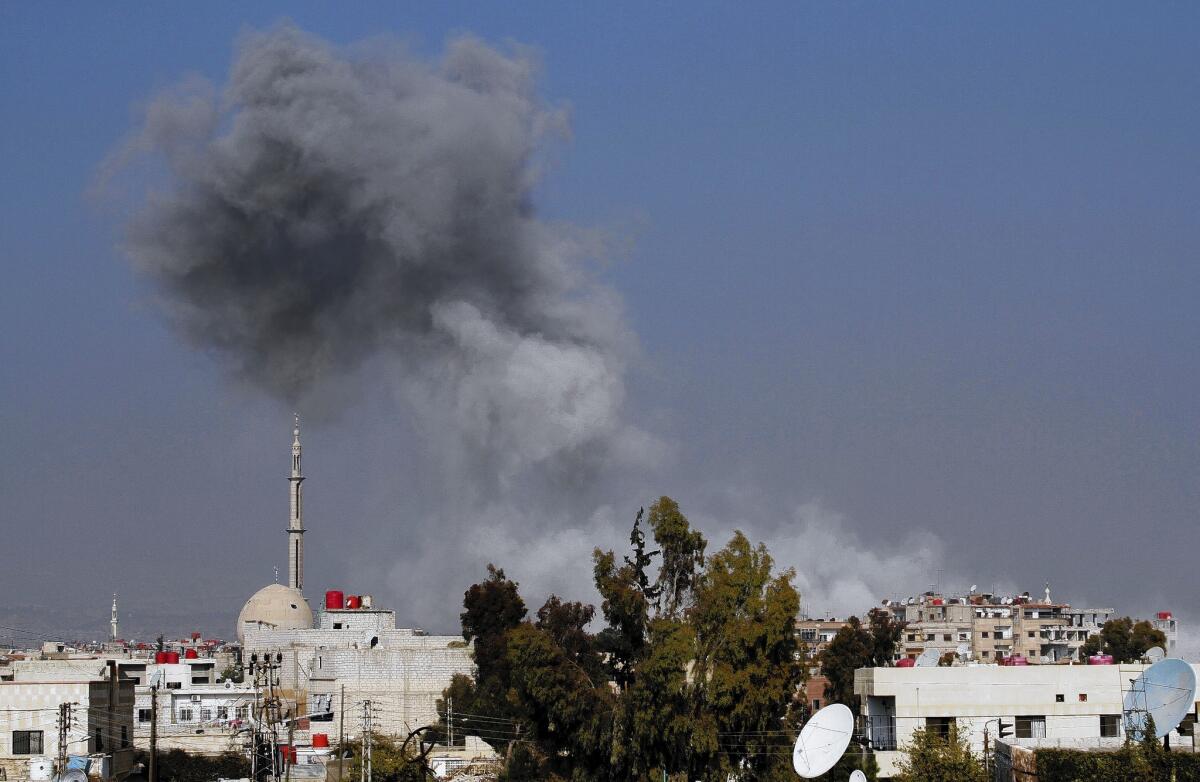Relatively moderate Syrian rebels gain against Islamic extremists

- Share via
AMMAN, Jordan — Infighting among Islamist antigovernment groups in northern Syria continued for a third day Sunday, as more moderate rebel factions engaged in a large-scale rout of an extremist group affiliated with Al Qaeda.
The Mujahedin Army, a new coalition of ostensibly moderate Islamist groups, as well as factions affiliated with the Western-backed Free Syrian Army and the Islamic Front, consolidated their gains against the Islamic State of Iraq and Syria, or ISIS, in what activists hailed as a “second revolution.”
“The rebels have achieved tremendous progress against ISIS in all the points of conflict,” said Abu Bakr, a pro-opposition journalist for the Shaam News Network in Raqqah, specifically referring to areas around the cities of Idlib and Aleppo.
Another activist, who goes by the name Mohandess Abu Hamzeh, added that many facilities used by the Islamic State of Iraq and Syria had been handed over to Al Nusra Front, another Al Qaeda-affiliated group that is nevertheless viewed as more moderate.
Still, although the Islamic State of Iraq and Syria has suffered defeats and defections, its fighters were reported to be moving toward the vital Bab al-Salameh crossing from Syria into Turkey “so as to take control of it,” according to the Facebook page of Aleppo Pulse, an opposition news site. The Turkish government, alarmed over the latest fighting near its border, closed the crossing.
The Islamic State of Iraq and Syria, considered to be the most extreme of the groups aiming to overthrow the government of President Bashar Assad, has increasingly antagonized local populations as it imprisons activists critical of the group’s methods. It also attacks other antigovernment factions in a bid to consolidate its hold over swaths of northern Syria.
“People just couldn’t take it anymore, after all the kidnapping and arrests and attacks,” complained Mohammad Hassano, an activist in Azaz. “People were very angry at them, but there was hesitation in fighting them because of the priority of fighting the regime.”
Despite being acknowledged as having the most experienced soldiers, the Islamic State of Iraq and Syria has been criticized for the many non-Syrian fighters swelling its ranks: Muslims from Europe and elsewhere, called muhajireen, or “emigrants,” who travel across the porous Turkish-Syrian border to engage in “jihad” against Assad’s forces.
A Dutch-Turkish fighter with the Islamic State of Iraq and Syria confirmed reports of attacks targeting foreign fighters. “In some places [it’s] very dangerous for muhajireen at the moment, because of the infighting between ISIS and” the Mujahedin Army, the fighter wrote on the microblogging website Ask.fm.
The Islamic State of Iraq and Syria’s pullout from some of its strongholds has affected the battleground in the north, where government forces took advantage by launching an offensive near Aleppo, Idlib and Maarat Numan. Aleppo had been the target of a daily barrel bomb campaign that left 517 people dead, according to the pro-opposition Syrian Observatory for Human Rights.
The fighting comes in the run-up to the much delayed Geneva II peace conference, now scheduled for Jan. 22 but expected to be postponed again. The U.S.- and Russian-backed conference is meant to bring Assad’s representatives together with armed opposition rebels for the first time since the conflict began almost three years ago. It will also bring many of the countries that have had a hand in the conflict, whether by the financing of proxy forces or by direct military involvement.
Iran, which is seen as the government’s main backer along with Russia, has faced stiff opposition to participation in the talks. Yet Secretary of State John F. Kerry, at a news conference in Jerusalem, raised the possibility of an Iranian role.
“Now could they contribute from the sidelines? Are there ways for them, conceivably, to weigh in? Can their mission that is already in Geneva … be there in order to help the process? It may be that there are ways that could happen,” Kerry said.
Bulos is a special correspondent.
More to Read
Sign up for Essential California
The most important California stories and recommendations in your inbox every morning.
You may occasionally receive promotional content from the Los Angeles Times.














